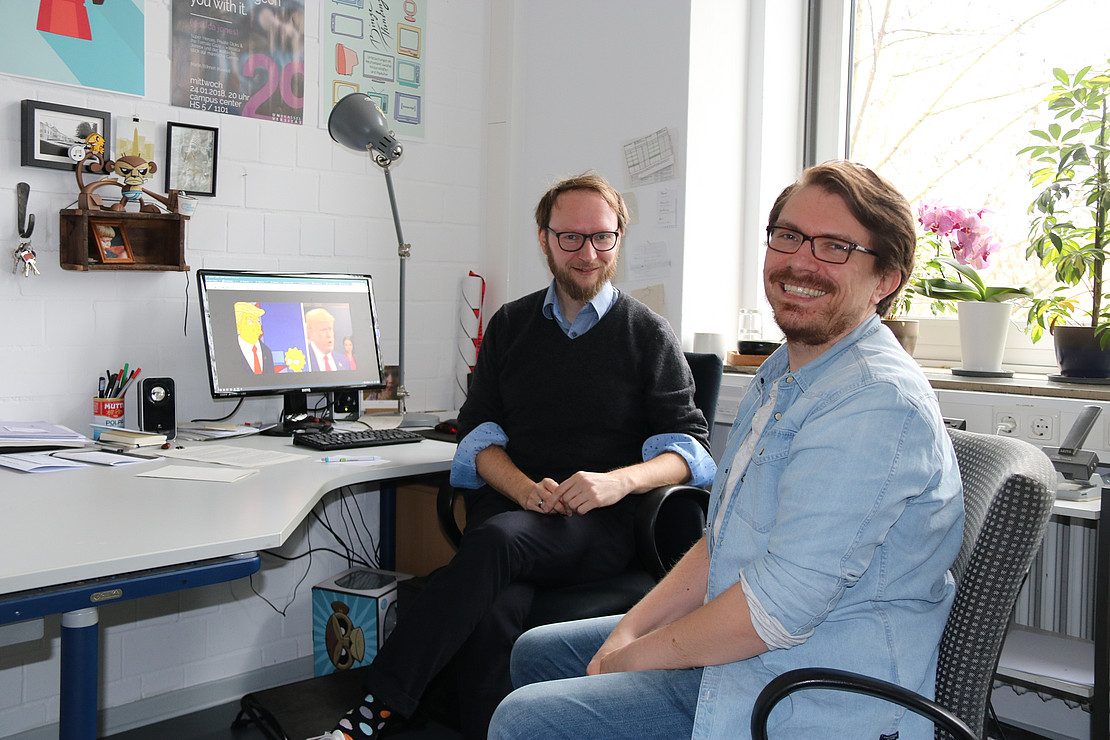This page contains automatically translated content.
The Simpsons, Nerds and Fridays For Future
 Image: University of Kassel.
Image: University of Kassel.The Simpsons have been around for 30 years now - the pilot episode of the American comic series was broadcast on December 17, 1989. You don't have to have studied philosophy to like them. "But it helps," says Martin Böhnert and smiles. At first glance, the research topic he is devoting himself to with his colleague Paul Reszke seems unusual: "Investigations in the Interplay between Science and Pop Culture," is the subtitle of a book the two have published.
The Simpsons do not appear in it, but instead a large number of examples are used by the two authors to illustrate the insights that can be gained from analyzing films, television series and comics that at first glance tend to be classified as shallow entertainment.
"A good example is the zombie series The Walking Dead," says Paul Reszke. "Of course, you can just be entertained by the series and enjoy the creep factor if you want to," Reszke continues. "But if you put on your science glasses, so to speak, you can find great examples in it of how social issues are addressed in a fictional world. For example, do categories like race, class and gender still matter when social coexistence is reduced to the basic instinct of survival? And can civilization emerge again at all when institutions of cultural memory such as museums or holidays no longer exist?"
For their book, "From Binge Watching to Binge Thinking," the pair focused primarily on narratives in which a so-called secondary world is constructed - a term coined by the famous author of the "Lord of the Rings" trilogy, J.R.R. Tolkien. "At its core, a secondary world is about creating a world that is consistent and coherent in itself, while at the same time showing the unreal of that world, which is beyond the experiential horizon of our reality," says Böhnert. "It is precisely through 'realistic,' that is, believable other-worldly worlds that reflection on 'our' reality is stimulated."
In this respect, The Simpsons is not as fruitful for the two scientists as other television series. "The world of The Simpsons is too similar to ours in this respect," says Böhnert. Nevertheless, the series is not completely uninteresting for the two from a scientific perspective. That The Simpsons has the potential to arouse scholarly interest has already been demonstrated by an anthology published in 2001 under the title "Subversion at Prime Time: The Simpsons and the Myths of Society," the third edition of which is already out of print.
"The Simpsons are, after all, now distributed worldwide, and many characters have pop-icon status as a result, becoming role models," Reszke says. One of those role models, he says, is the series character of Lisa Simpson, who goes through an exciting evolution. "At the beginning of the series, Lisa is quite one-dimensional; as a conformist nerd and know-it-all, she plays the antithesis to her rebellious brother Bart. But as the series progresses, she begins to criticize the establishment and discovers issues she's passionate about - like environmentalism."
Then, as Lisa Simpson begins to rebel in her turn, she develops the aforementioned subversive potential. This pattern is also used in another popular narrative: Hermione Granger from the Harry Potter books. "She, too, is first the class nerd, but then, through her commitment to the house elves, comes increasingly into conflict with the political establishment because she uses what she has learned: a critical, reflective approach to the world," Reszke describes.
This pop-culturally long-established image is highly intriguing and topical. "We don't know anything specific about Greta Thunberg's school performance. But with her school strike and her commitment to climate protection, she definitely resembles the critical Lisa Simpson we know from later Simpsons episodes," says Martin Böhnert.
"To conclude from this that Greta Thunberg's success is also based on her similarity to Lisa Simpson and Hermione Granger would, of course, be too far-fetched," adds Reszke. "But identifying those elements that are common to all three and then looking at the extent to which two fictional pop phenomena prepared Greta Thunberg's development into a third would be an interesting research question from our point of view."
Text: Markus Zens, publik 4/2019